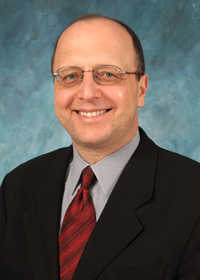 The final results of the first randomized study of protected stenting for the carotid artery in patients at high-risk for standard surgery are being published in today’s issue of the New England Journal of Medicine (NEJM).
The final results of the first randomized study of protected stenting for the carotid artery in patients at high-risk for standard surgery are being published in today’s issue of the New England Journal of Medicine (NEJM).
UNMC’s Pierre Fayad, M.D., who served as the only neurologist on the five-member Executive Committee of the SAPPHIRE study, is one of the co-authors of the publication. SAPPHIRE, an acronym for “Stenting and Angioplasty with Protection in Patients at High Risk for Endarterectomy,” involved 30 investigative sites and more than 334 patients in the United States.
Dr. Fayad, Reynolds Centennial Professor and chairman of UNMC’s Department of Neurological Sciences, presented the initial study results based on the 30 days outcomes in February 2003 at the plenary session of the American Heart Association’s Annual International Stroke Conference in Phoenix.
He eventually was asked to present the results at the plenary session of the American Academy of Neurology Annual Meeting in April 2003, after being selected from among thousands of other scientific presentations. UNMC Today reported on Dr. Fayad’s participation in the study. Those results received one of the highest validations in the world of biomedicine when they were published in today’s NEJM.
The NEJM article represents the first official publication of the long-awaited study results. It is the third co-authored study by Dr. Fayad to be published in the NEJM and his second since joining the UNMC faculty more than three years ago.
The study was designed to test the hypothesis that the less invasive strategy, stenting with distal protection, was not inferior, or equivalent to endarterectomy in patients at high-risk for surgery. The primary end point of the study was the cumulative incidence of a major cardiovascular event at 1 year – a composite of death, stroke, or myocardial infarction within 30 days after the intervention or death or ipsilateral stroke between 31 days and 1 year.
Blockages in the carotid artery are generally treated with a surgery called carotid endarterectomy, in which the plaque buildup is removed. In carotid stenting, a balloon-tipped catheter is threaded into the artery, the balloon is inflated to push back the plaque and a mesh tube, called a stent, is inserted to keep the artery open.
The SAPPHIRE trial combined stenting in the neck (carotid) arteries with an AngioGuard filter, an umbrella-like device to prevent blood clots and other particles from reaching the brain and causing stroke during the procedure. The stent and the filter used in the study recently received conditional approval by the Food and Drug Administration, based on the results from SAPPHIRE.
Surgery and traditional stenting carry risks of creating blood clots or dislodging particles from the fatty deposits they are trying to clear. When such debris are unleashed, they can travel to the brain and cause strokes, Dr. Fayad said. To reduce that risk during surgery, the artery is clamped while the atherosclerotic plaque is cut out. Stenting is done without stopping blood flow.
The abstract in the NEJM article concludes: “Among patients with severe carotid-artery stenosis and coexisting conditions, carotid stenting with the use of an emboli-protection device is not inferior to carotid endarterectomy.”
“This is the first study to demonstrate that a safe and effective alternative exists for patients at high-risk for surgery,” Dr Fayad said. “The publication of our team’s results in the NEJM is a credit to the quality of the design and execution of the study and the relevance of the data to physicians and patients. The NEJM, along with Lancet, JAMA and others, represents one of the highest standards in the world for medical journalism. There is a lot of scrutiny about the research methods and quality of data.”
Dr. Fayad is the only neurologist on the five-member executive committee, which helped design and organize the large study – an honor he attributes to his years of experience with the design, development and execution of clinical trials.
Jason Johanning, M.D., vascular surgeon, UNMC’s Department of Surgery, said the published results after one year also validate the assessment he made of Dr. Fayad’s study last year.
“In conjunction with neurologists, vascular surgeons and vascular interventionalists at UNMC provide carotid stenting to appropriate candidates,” Dr. Johanning said. “Carotid stenting offers an improved outcome for patients who would otherwise be at too high a risk for standard surgery.”